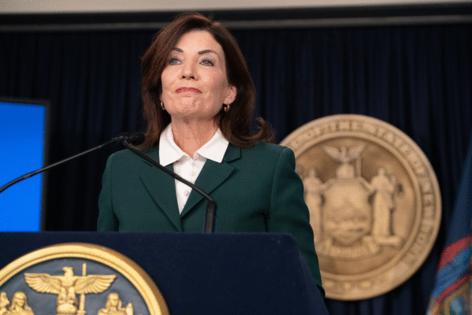Editorial: Shielding New York's doctors: Out-of-state anti-abortion laws don't apply here
Published in Op Eds
Facing down anti-abortions politicians in Louisiana and Texas who want to export their policies here, Gov. Kathy Hochul is rightly refusing, asserting New York’s right to set its own laws. Ultimately, the matter will reach the U.S. Supreme Court, which has stated that abortion is to be decided on the state level and New York has decided to allow doctors to provide abortion care to women and girls.
When one hears that a physician has been the subject of both a criminal indictment and extradition order from one state and a civil lawsuit from another, the natural assumption is that this is a doctor who has violated the Hippocratic Oath in some heinous way, abusing the authority of their training and position negligently or for personal gain. For Dr. Margaret Carpenter of New York, though, this harrowing circumstance is downstream from something much simpler: providing health care for her patients.
Last Tuesday, Louisiana Gov. Jeff Landry personally signed an extradition warrant for Carpenter, an upstate physician who had prescribed abortion pills to a resident of that state. Just two days later, a Texas state judge levied a $100,000 fine against the same doctor, the result of a civil lawsuit filed against her by Texas Attorney General Ken Paxton.
Carpenter should neither pay a cent nor be detained for engaging in the long-standing accepted medical practice. We commend Hochul for forcefully refusing to sign an extradition order for Carpenter, a refusal given teeth by her earlier signing of a shield law that was designed precisely to protect providers like Carpenter from the overreach of overzealous state officials like those in Texas and Louisiana.
Both the civil lawsuit and the criminal indictment are likely to reach the highest court in the land. This is of course only possible in the first place because the U.S. Supreme Court turned its back on decades of precedent and overturned Roe v. Wade in 2022, paving the way for states like Texas and Louisiana to not only try to prohibit this type of health care on their territory but reach afield and try to prevent their residents from accessing it through providers elsewhere.
In addition to pursuing these providers, they’ve done this by trying to limit the ability of their own residents to leave the state to obtain care elsewhere, in moves that are anti-liberty and frankly anti-American.
The Supreme Court should not have overturned Roe, but at the very least it couched this terrible decision in the language of return to state-level legislation. If that’s so, then it cannot make sense for certain states to simply impose their regressive anti-healthcare policies on other states that have licensed medical practitioners legally prescribing FDA-approved therapeutics.
The Louisiana extradition order is a slap in the face that should be rightly used as kindling, and if the court retains any guiding principles, it should recognize that allowing cases like these to proceed directly undermines its earlier ruling, not to mention that it opens the door for all sorts other inter-state shenanigans.
Is it reasonable to end up with lowest-common-denominator legislation for everything else, where any one state with the most contrived and regressive policies can enforce these policies nationally? Can a resident of a different state come to New York and sue our law enforcement for refusing to grant them a concealed carry permit because the laws are more permissive in his home state? This quickly gets ridiculous.
The courts, which have so often otherwise championed the principles of federalism, should nip this in the bud before then.
___
©2025 New York Daily News. Visit at nydailynews.com. Distributed by Tribune Content Agency, LLC.




























































Comments